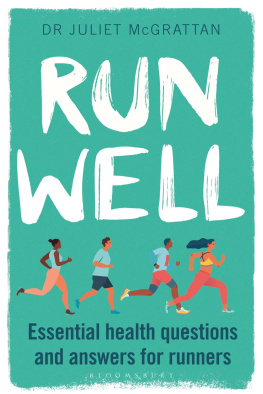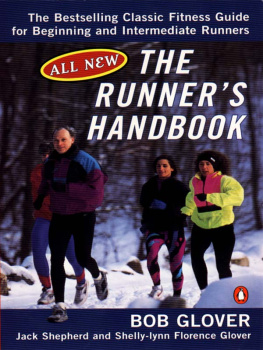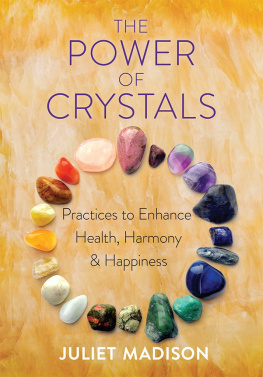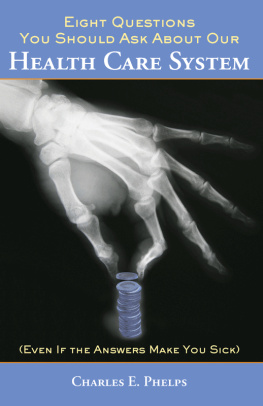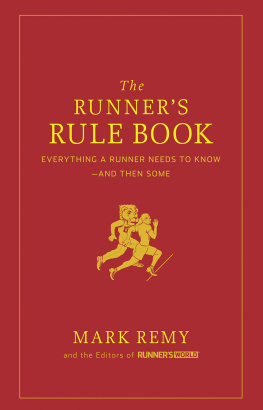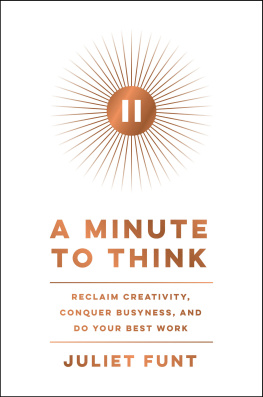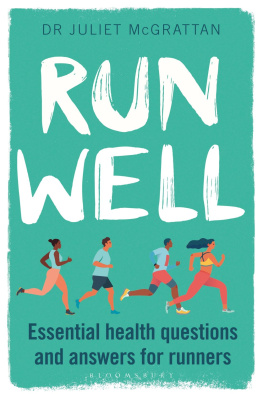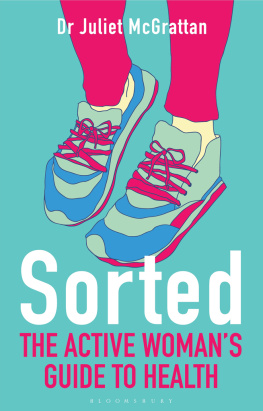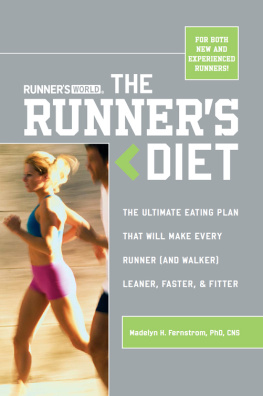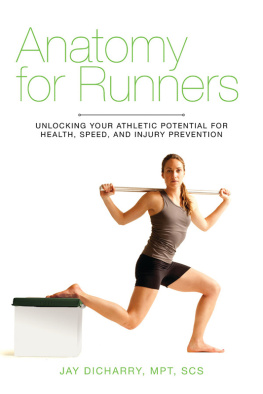Juliet McGrattan - Run well : essential health questions and answers for runners.
Here you can read online Juliet McGrattan - Run well : essential health questions and answers for runners. full text of the book (entire story) in english for free. Download pdf and epub, get meaning, cover and reviews about this ebook. year: 2021, genre: Religion. Description of the work, (preface) as well as reviews are available. Best literature library LitArk.com created for fans of good reading and offers a wide selection of genres:
Romance novel
Science fiction
Adventure
Detective
Science
History
Home and family
Prose
Art
Politics
Computer
Non-fiction
Religion
Business
Children
Humor
Choose a favorite category and find really read worthwhile books. Enjoy immersion in the world of imagination, feel the emotions of the characters or learn something new for yourself, make an fascinating discovery.
- Book:Run well : essential health questions and answers for runners.
- Author:
- Genre:
- Year:2021
- Rating:3 / 5
- Favourites:Add to favourites
- Your mark:
- 60
- 1
- 2
- 3
- 4
- 5
Run well : essential health questions and answers for runners.: summary, description and annotation
We offer to read an annotation, description, summary or preface (depends on what the author of the book "Run well : essential health questions and answers for runners." wrote himself). If you haven't found the necessary information about the book — write in the comments, we will try to find it.
Run well : essential health questions and answers for runners. — read online for free the complete book (whole text) full work
Below is the text of the book, divided by pages. System saving the place of the last page read, allows you to conveniently read the book "Run well : essential health questions and answers for runners." online for free, without having to search again every time where you left off. Put a bookmark, and you can go to the page where you finished reading at any time.
Font size:
Interval:
Bookmark:



Contents
Dear Runner,
I have been a part of this wonderful community for 13 years and it has brought me so much joy. It has supported, encouraged and motivated me, helped me be my best, finished in front, behind and beside me, and cheered me on regardless. Its not just the running, its the people and the opportunities that it has brought me. I have made friends, travelled the world and even found a new career. It was time for me to give back. I wanted to use my years of running, my 16 years working as a GP and my new career as a writer to create something for you all.
The human body is a complex and fascinating thing, and I am still learning about it. Despite our best intentions, things go wrong and navigating the online forums and websites to get the information you need can be a tricky and even dangerous task. Over the years as a GP and as a health expert for many magazines and online communities, I have been asked literally hundreds of running-related health questions. I hope in the pages of this book you will find something to reassure you, to inform you and even to make you laugh. I want you to learn about your body so you can be amazed by it, know how to look after it and feel confident about when to ask for help.
I have enjoyed writing this book so much. I have imagined you all, across the desk from my computer, asking me questions and listening to my answers. I feel you have shared this journey with me. So, my running friends, here is my book and I hope it helps you to run well.
P.S. Do remember that this book in no way replaces seeing a medical professional who can assess you, examine you and take your personal medical and family history into account. If youre a competing athlete, then always check that any medications you use arent prohibited. But I know you know that!
Running is a journey of discovery. Not just of running routes and new places but of your own human body. Your capacity to endure and perform. Your resilience and courage. Your ability to harness the power of running and use it in other areas of your life. But, like any journey, there are ups and downs, delays and set-backs. Its a steep learning curve with huge potential for errors but incredible rewards too.
I cast my mind back to my first half marathon. The New Balance English Half Marathon in Warrington in 2010. I had been running for two years and had never run more than 10 miles. I lined up at the start, already soaked and frozen from the torrential rain. I had no bin liner to keep me dry, no jumper to toss aside once Id begun to run. I set off with no watch, no race fuel and wearing shorts that were not remotely designed for long distance running when you dont possess a thigh gap! It was the hardest thing I had ever done. My Dad was watching runner after runner cross the finish line and wondering if I had got lost. When I eventually did (just about) manage to raise my arms in celebration and claim my medal, I was broken. I could barely take another step or string a sentence together. My Dad bundled me into a restaurant, fed me pasta and drove me home. The next day I had such severe chafing that I had weeping wounds on my inner thighs. I had to use surgical dressings with tights over the top to even be able to walk. I couldnt wear a bra because the skin around my chest was so raw. My feet were one big blister. Everything hurt. Stairs were an impossibility, in fact, even turning over in bed made me wince and groan. I was a mess. But I was happy. I did it! I rose to what was a seemingly impossible challenge for me. I wanted more. I wanted to do it again and do it better, faster and with food, Vaseline and Lycra shorts! I knew I had a lot to learn about my body and myself. I was thirsty to find out the answers to all the questions I had.
That was the beginning of a true voyage of discovery for me. I want to share it with you. In this book I want to take you on a journey too, around your body. Well visit each body system in turn, starting at the head and working our way down. Well explore the anatomy and how each system works before turning to the questions that runners have asked me over the years. Therell be surprising facts, things to try at home and runners sharing their own experiences along our route. Grab your running shoes and water bottle. The starting gun has fired and the first stop is the brain.
......................
Firmly protected inside our skull bones lies the control centre for our entire body. From regulating our breathing to determining our emotions, from activating muscles to weighing up facts, our brain masterminds it all. Despite extensive research we still dont fully understand how it works. Have you ever wondered whether running can make you more intelligent or why people get a headache after a run? And what exactly are the links between running and mental health? Lets get our heads down and explore this mind-blowingly clever part of our body.
The cerebral cortex is the outer part of the brain. It looks rather like a large, lumpy walnut and its made up of four lobes: the frontal, parietal, temporal and occipital lobes. Each of these is responsible for different behaviours and functions.

Deeper inside the brain youll find the midbrain, pons and medulla, which make up the brain stem. This controls a number of automatic functions, such as breathing, our heart rate and blood pressure. Behind the brain stem is the cerebellum, which is vital to us as runners, because it helps to control posture, balance and co-ordination. Other smaller areas of the brain include the thalamus, the hypothalamus, the limbic system and the basal ganglia. They all work closely together to make us who we are.
Brain cells are specialised cells called neurons and there are said to be nearly 100 billion of them in the brain. Neurons use chemical messages (neurotransmitters) and electrical impulses to communicate information around the brain and to the rest of the body at an astonishing speed. In return, neurons bring messages back to the brain, which processes them, takes into account other feedback from multiple sources, including glands which send their messages in the form of hormones, puts all the data together and determines what happens next. Its mind-boggling.
When you understand the functions of the different parts of the brain, its easy to see how damage to one area can affect particular body functions or behaviours. Medical research is still trying to unpick exactly what goes on inside the brain and how exercise can influence it, but lets look at some of the knowledge we have so far and answer some questions. Well then move on to look at headaches, eyes and ears, all of which can pose important issues in the heads of runners.
Did you know?
The average human brain weighs about 1400g, whereas a cats brain weighs about 30g and an elephants 6000g.
Q I know running improves my mental health, but how?
A Running is a very powerful tool for keeping you mentally well. First, we know that running causes chemical changes in the brain, releasing endorphins substances that make you feel good both during and for a time after a run. Alongside this, running and other types of exercise also have an anti-inflammatory effect in the body. We know that many major diseases, including depression, are partly caused by a long-term, low-grade inflammation. This inflammation is caused by a number of factors, but one of them is inactivity. Running can help to counteract this, because it not only reduces harmful internal fat in the body (a significant cause of inflammation), but also causes the muscles to release anti-inflammatory proteins called myokines.
Font size:
Interval:
Bookmark:
Similar books «Run well : essential health questions and answers for runners.»
Look at similar books to Run well : essential health questions and answers for runners.. We have selected literature similar in name and meaning in the hope of providing readers with more options to find new, interesting, not yet read works.
Discussion, reviews of the book Run well : essential health questions and answers for runners. and just readers' own opinions. Leave your comments, write what you think about the work, its meaning or the main characters. Specify what exactly you liked and what you didn't like, and why you think so.

